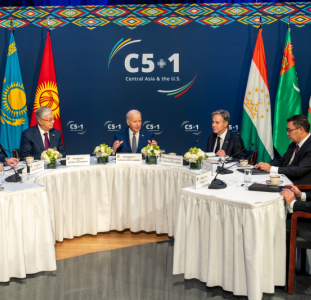The point is that the adoption of this special law cannot be judged in isolation from the dream of the Japanese political elite to change the role and increase the weight of Japan in the international politics. In the opinion of Japanese politicians, implementation of this dream is possible only if it is supported by the military power. But the “peaceful” constitution of Japan obstructs such approach. The same pro-militarist sentiments are also observed in the Japanese business community that sees huge potential in the arms trade. In this connection, the US warship refueling mission is first of all a next step towards updating the National Constitution and abolishing its Clause 9.
The extension of the mission is also connected with settlement of current disaccords in the Japanese-American alliance. Disagreements relating to rent payment for military base territories and dislocation of the US troops slightly strained the relations within the alliance. So, it is not surprising that at the November meeting of Japanese Prime Minister Yasuo Fukuda with US President George Bush, Tokyo let Washington know that the mission extension correlates with the settlement of these problems and alleged deletion of North Korea from the list of the states supporting the terror. Due to a delicate problem relating to kidnapping of Japanese citizens by North Korean Secret Service in the late 70s and early 80s, Japan never supports such intentions of Washington, while the latter according to certain sources already has given to Pyongyang the respective promise in exchange of the consent to stop implementation of its nuclear weapon program.
If Fukuda even never wished it, he would have to proceed with the bargain due to the critics on the side of opposition. For example, on the eve of the aforesaid talks, General Secretary of the Japanese Democratic Party Yukio Hatoyama caustically said that “adoption of this law (a graft antiterrorism law was adopted by the Parliament Lower Chamber on November 13 – editor’s note) is a gift that the Premier will bring to Washington”.
Nevertheless, it seems that the allies have reached an agreement because when concluding his first and in this sense notable international visit, that underlines the priorities, Fukuda affirmed the American President that the Japanese Government will do its best to adopt the updated law on participation of Japanese ships in refueling the coalition warships in the Indian Ocean.
The promise started being fulfilled in advance, already on November 13 when the Lower Chamber of the Japanese Parliament adopted a revised antiterrorism law. According to the revised law the mission of the Japanese MSDF will be limited by refueling and supplying potable water only to those coalition warships that are engaged in checking the vessels suspected of involvement in terrorist activities or arms smuggling but not those that directly support combat or relief operations in Afghanistan.
The updates in the law reflect the efforts of the ruling Liberal-Democratic Party of Japan to find a compromise with its opponents in the Democratic Party. The drop in popularity of Shindzo Abe’s Government to 30% and lower enabled the Democratic Party to receive a majority of votes in the Upper Chamber at the July parliamentary elections, and the Prime Minister had to resign. Inspired by the success the DP leaders rejected the Fukuda’s proposal to form a coalition government that was put forward by the Premier on the eve of the special law expire date.
The DP-led opposition stands against extension of the Indian Ocean Mission stating that the involvement of the Japanese Navy was not legitimized by a UN resolution. Having a majority in the Upper Chamber of the Parliament the Democrats and other opposition parties are ready to block the respective laws initiated by the ruling LDP. At the same time, the DP control over the Lower Chamber is not sufficient to completely veto a draft law but makes it possible to postpone the decision by 60 days thereafter the draft law is to be returned to the Lower Chamber and may be adopted if it is supported by two thirds of the votes.
The refusal to form a political coalition is connected with the intents of the Democratic Party to insist on elections to the Lower Chamber in the nearest future, receive majority of votes there too and replace the LDP. However, the DP is also not consolidated today. The party was founded in 2003 through merger of the Liberal and Democratic Parties, and from that time onwards it claims a role of an actual alternative to the LDP that rules in Japan for a half of century. But as the alliance has been formed by too different political forces, the Democratic Party suffers from internal disaccords.
For example, just the fact of the talks between DP Leader Itiro Odzava and Fukuda put the situation on the verge of Odzava’s resignation. The majority of DP leaders do not accept even such talks not to mention the idea of any coalition. At the same time, observers agree that Odzava to all seeming uses the situation around the MSDF Mission as a political weapon against the LDP. Earlier he was an active supporter of the US foreign policy, e.g. Odzava supported the USA in the first Gulf War. Thus, the dispute on extension of the MSDF Mission in the Indian Ocean to a great extent is a bargaining chip in the struggle for power.
It is surprising but against the background of regular efforts of Japan to compensate its foreign policy inferiority complex, parliamentary intrigues and Japanese-American bargaining, it seems that everybody forgot about a key message – actual war on terror.









